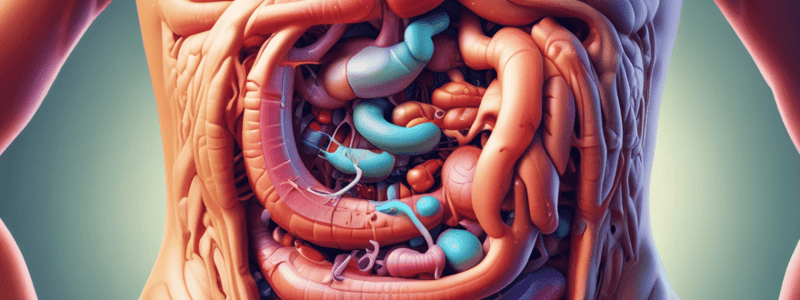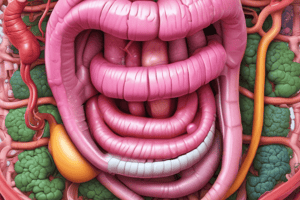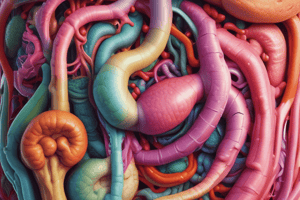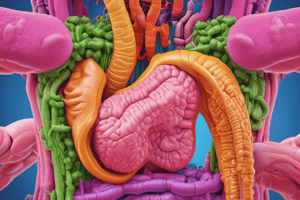Podcast
Questions and Answers
Welches Organ im Verdauungssystem spielt eine entscheidende Rolle beim Mischen von Nahrung mit Magensaft?
Welches Organ im Verdauungssystem spielt eine entscheidende Rolle beim Mischen von Nahrung mit Magensaft?
- Speiseröhre
- Leber
- Dünndarm
- Magen (correct)
Welcher Teil des Darms ist hauptsächlich für die Aufnahme von Wasser und Elektrolyten verantwortlich?
Welcher Teil des Darms ist hauptsächlich für die Aufnahme von Wasser und Elektrolyten verantwortlich?
- Dickdarm (correct)
- Magen
- Dünndarm
- Leerdarm
Was ist der Hauptzweck von Darmbewegungen?
Was ist der Hauptzweck von Darmbewegungen?
- Abfallausscheidung (correct)
- Nährstoffaufnahme
- Nahrungsmittelmischung
- Verdauungssaftsekretion
Welcher Teil des Verdauungssystems absorbiert die meisten Nährstoffe?
Welcher Teil des Verdauungssystems absorbiert die meisten Nährstoffe?
Was bezeichnet Absorption im Zusammenhang mit der Verdauung?
Was bezeichnet Absorption im Zusammenhang mit der Verdauung?
Welche Strukturen erhöhen die Oberfläche des Dünndarms für eine maximale Nährstoffaufnahme?
Welche Strukturen erhöhen die Oberfläche des Dünndarms für eine maximale Nährstoffaufnahme?
Welche Rolle spielen Darmbewegungen normalerweise im Verdauungssystem?
Welche Rolle spielen Darmbewegungen normalerweise im Verdauungssystem?
Welche Funktion hat der Magen im Verdauungssystem hauptsächlich?
Welche Funktion hat der Magen im Verdauungssystem hauptsächlich?
Welcher Teil des Verdauungssystems ist für die Verteilung von Nährstoffen im Körper verantwortlich?
Welcher Teil des Verdauungssystems ist für die Verteilung von Nährstoffen im Körper verantwortlich?
Was geschieht während der Absorptionsphase im Verdauungssystem hauptsächlich?
Was geschieht während der Absorptionsphase im Verdauungssystem hauptsächlich?
Flashcards are hidden until you start studying
Study Notes
The digestive system plays a crucial role in breaking down food and extracting necessary nutrients for the body. Comprising the GI tract and accessory organs, it involves several key processes, including ingestion, digestion, nutrient absorption, and excretion. Let's delve deeper into the subtopics we are interested in: stomach, intestines, bowel movements, and absorption.
Stomach
The stomach is a crucial organ in the digestive system. It receives partially digested food from the esophagus and mixes it with gastric juices containing hydrochloric acid and enzymes. This mixture, called chyme, is then slowly released into the small intestine. The stomach provides a protective barrier against the harsh environment of gastric juices and regulates the rate of food passage into the small intestine.
Intestines
The small and large intestines are responsible for the majority of digestion and nutrient absorption. The small intestine secretes digestive juices from the pancreas, liver, and small intestine itself. Moving in waves and contractions called peristalsis, the small intestine mixes digested food particles with these juices, allowing for the final stages of nutrition extraction. The large intestine, also referred to as the colon, mainly absorbs water and electrolytes from undigested food materials and aids in the formation of stools.
Bowel Movements
Bowel movements occur when the waste matter accumulated in the large intestine is expelled through the rectum and anus. They serve as a means for eliminating indigestible food residues, bacteria, and excess water. Normally, bowel movements are frequent and regular, reflecting the efficient process of nutrient uptake and waste removal within the digestive system.
Absorption
Absorption refers to the process by which nutrients are absorbed across the lining of the small intestine and transported to the liver for distribution throughout the body. The small intestine has a highly specialized structure with finger-like projections called villi and tiny hair-like structures called microvilli, increasing its surface area for maximum absorption. Nutrients, such as proteins, carbohydrates, and fats, are absorbed into the bloodstream in a process facilitated by enzymes and transporter molecules.
In summary, the digestive system is a sophisticated network of organs and processes designed to facilitate daily sustenance and overall health. By understanding the role of the stomach, intestines, bowel movements, and absorption, we gain insights into the intricate balance that maintains our ability to consume, process, and utilize the nutrients necessary for life.
Studying That Suits You
Use AI to generate personalized quizzes and flashcards to suit your learning preferences.




